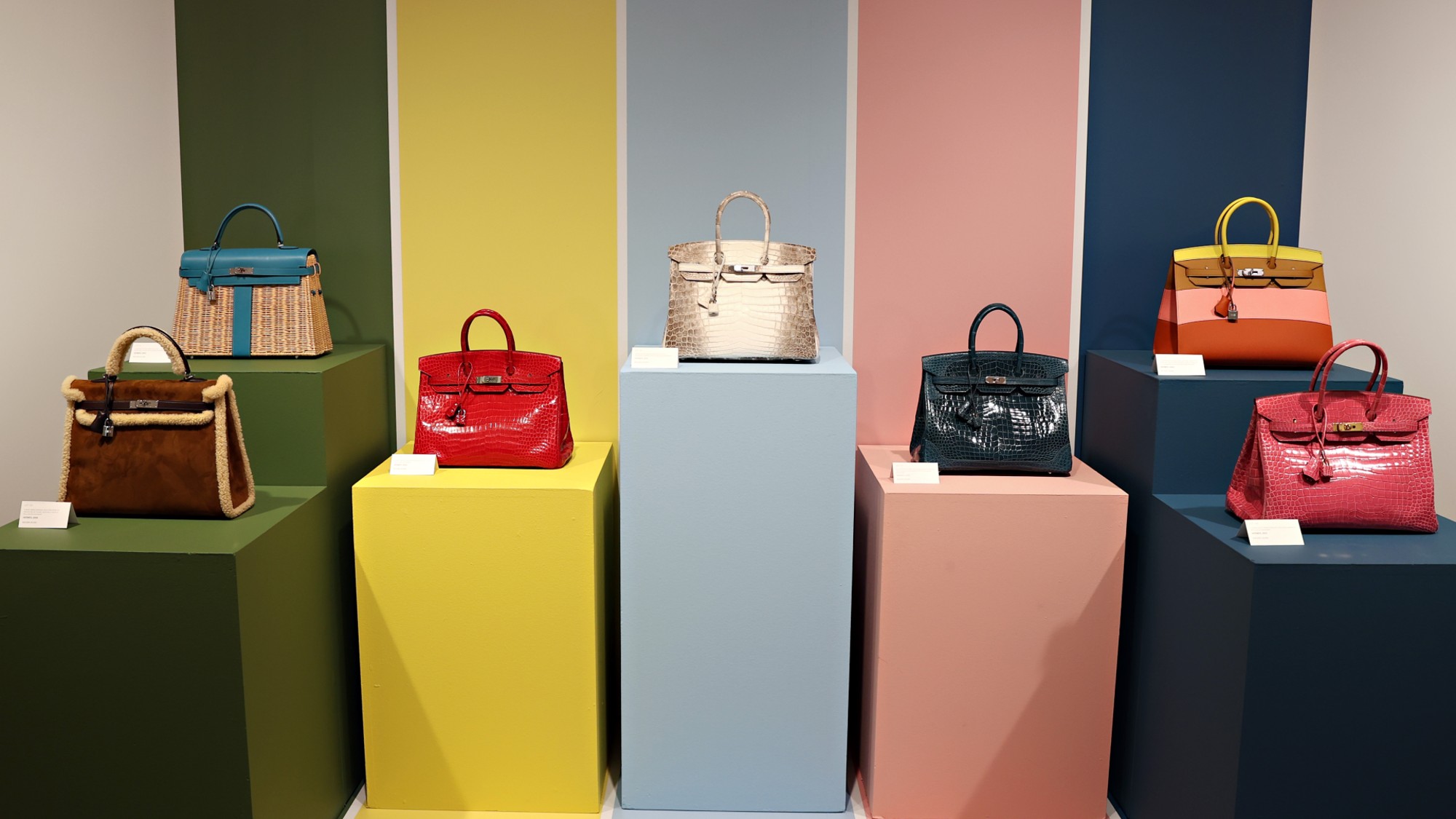Controversy is brewing over a lawsuit involving Hermès' luxury bags
The lawsuit alleges the company only sells bags to people with a 'sufficient purchase history'


A free daily email with the biggest news stories of the day – and the best features from TheWeek.com
You are now subscribed
Your newsletter sign-up was successful
Hermès is one of the world's best-known — and most expensive — luxury retailers, with products on the brand's website ranging from hundreds to thousands of dollars. However, a new lawsuit against the company is opening debate over whether customers have a legal right to buy Hermès' products.
The lawsuit, filed in California on March 19, revolves around Hermès' Birkin handbag. An infamous symbol of wealth, the Birkin is one of the most exclusive luxury items in the world. Sold only at Hermès' retail stores, the cheapest variant of the Birkin starts at $10,145; higher-end versions have been sold for more than $100,000. The lawsuit alleges that Hermès only sells Birkins to customers with a "sufficient purchase history," claiming that one of the plaintiffs was "coerced into purchasing ancillary products in order to obtain access to Hermès Birkin bags." This represents a violation of antitrust and competition laws, the lawsuit claims, because of the "unique desirability, incredible demand and low supply" of Birkin bags.
Reaction to the lawsuit has been mixed. There has been some support for the lawsuit's antitrust allegations, but others claim that the bigger picture is more complex.
The Week
Escape your echo chamber. Get the facts behind the news, plus analysis from multiple perspectives.

Sign up for The Week's Free Newsletters
From our morning news briefing to a weekly Good News Newsletter, get the best of The Week delivered directly to your inbox.
From our morning news briefing to a weekly Good News Newsletter, get the best of The Week delivered directly to your inbox.
Legal experts are 'dubious on the suit's merits'
Many people in the legal field are "dubious on the suit's merits" because Hermès "does not control the robust secondhand market for its bags," Amanda Mull said for The Atlantic. While rare, there are instances where "people sometimes do just walk into a boutique off the street, ask nicely, and get lucky."
While the Birkin bag is extraordinarily expensive, this is because they are "actually pretty rare, compared with the products made by the brand's closest competitors," said Mull. It can take up to 40 hours to manufacture a single Birkin bag, and this helps "Hermès and its fans spin a compelling tale about why its prices — high even among luxury brands, though not by as wide a margin as they once were — are justifiable," said Mull.
When it comes to the lawsuit, Hermès "has it in the bag," Susan Scafidi, the academic director at Fordham University's Fashion Law Institute, said to The Washington Post. This is because the luxury brand "doesn't tell buyers how much they need to spend to gain access to the Birkin," making it harder for the plaintiffs to pinpoint a specific instance in which Hermès is breaking antitrust laws.
Additionally, a judge is "more likely to rule that a sales practice violates the law when the item in question can be deemed a necessity," Douglas Hand, a lawyer who works with high-end fashion brands, said to The New York Times. This includes products such as medications and other medical items, but there are "not as many reasons for why every consumer needs access to a Birkin bag or any specific luxury item."
A free daily email with the biggest news stories of the day – and the best features from TheWeek.com
The law 'says it's illegal'
Even though a Birkin bag might not be a necessity, when it comes to Hermès' practices, the "law says it's illegal," Shaun Setareh, a lawyer representing the plaintiffs in the case, said to the Times. This is because Hermès is "preconditioning buying other products — scarves, belts, shoes, perfume, jewelry — before they give you the opportunity to buy a Birkin."
This lawsuit is arguing that Hermès isn't just keeping the bags exclusive, but that the "setup doubles as a sneaky moneymaking scheme," Clint Rainey said for Fast Company. The company achieves this by "forcing customers to buy a litany of items they don't necessarily want in order to purchase the item they do want." This allows the lawsuit to argue that Hermès' sales process is "anti-competitive and violates the Sherman [Antitrust] Act and California state laws."
No matter how the courtroom antics play out, the luxury goods industry will be "watching the lawsuit's progression to gauge the wider implications, as other high-end brands evaluate whether their own tactics could potentially line up with the legal definition" that violates antitrust, said Joan Kennedy for CNN. But while the law itself may be unclear on the matter, Hermès is "driven by supply, not demand," Erwan Rambourg, the global head of consumer and retail research at HSBC, said to CNN. "You buy luxury to be part of the club. That's what it's about. It defeats the purpose if the club is open to everyone."
Justin Klawans has worked as a staff writer at The Week since 2022. He began his career covering local news before joining Newsweek as a breaking news reporter, where he wrote about politics, national and global affairs, business, crime, sports, film, television and other news. Justin has also freelanced for outlets including Collider and United Press International.
-
 Bad Bunny’s Super Bowl: A win for unity
Bad Bunny’s Super Bowl: A win for unityFeature The global superstar's halftime show was a celebration for everyone to enjoy
-
 Book reviews: ‘Bonfire of the Murdochs’ and ‘The Typewriter and the Guillotine’
Book reviews: ‘Bonfire of the Murdochs’ and ‘The Typewriter and the Guillotine’Feature New insights into the Murdoch family’s turmoil and a renowned journalist’s time in pre-World War II Paris
-
 Witkoff and Kushner tackle Ukraine, Iran in Geneva
Witkoff and Kushner tackle Ukraine, Iran in GenevaSpeed Read Steve Witkoff and Jared Kushner held negotiations aimed at securing a nuclear deal with Iran and an end to Russia’s war in Ukraine
-
 Companies are increasingly AI washing
Companies are increasingly AI washingThe explainer Imaginary technology is taking jobs
-
 Trump wants a weaker dollar, but economists aren’t so sure
Trump wants a weaker dollar, but economists aren’t so sureTalking Points A weaker dollar can make imports more expensive but also boost gold
-
 Can Trump make single-family homes affordable by banning big investors?
Can Trump make single-family homes affordable by banning big investors?Talking Points Wall Street takes the blame
-
 Why is pizza in decline?
Why is pizza in decline?In the Spotlight The humble pie is getting humbler
-
 How prediction markets have spread to politics
How prediction markets have spread to politicsThe explainer Everything’s a gamble
-
 SiriusXM hopes a new Howard Stern deal can turn its fortunes around
SiriusXM hopes a new Howard Stern deal can turn its fortunes aroundThe Explainer The company has been steadily losing subscribers
-
 How will China’s $1 trillion trade surplus change the world economy?
How will China’s $1 trillion trade surplus change the world economy?Today’s Big Question Europe may impose its own tariffs
-
 Is a financial market crash around the corner?
Is a financial market crash around the corner?Talking Points Observers see echoes of 1929
